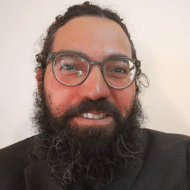
Louis Edgar Esparza
Professor
California State University – Los Angeles
MFP Cohort 35, 2008-09
I grew up in Colombian expat enclaves, dancing between polleras colorá in Elmhurst, Queens, and Paterson, New Jersey. Neither of my parents completed their college degrees. My first jobs were in landscaping, restaurants, and coffee shops. I learned that the benefits of labor are not in the outcome, but are inherent in the work. As a cheeky priest once told me, “persecution builds character.” Being stung by bees in the hot sun, or else serving cold antipasto on white linen, gave me a glimpse into what to expect in my labor as a sociologist.
My MFP Fellowship came at a time when I was completing my fieldwork in Colombia while still at Stony Brook. It gave me the time to translate and code my data, and to write the early drafts of what ultimately became Fields of Fire: Emancipation and Resistance in Colombia. MFP also connected me with intelligent colleagues across the country, some of whom I still contact when embarking on new ventures. I am indebted to MFP donors for this.
Mainly I teach first-generation Latino students from chronically under-funded high schools in East Los Angeles. Their experiences with classrooms in a state of physical decay make real the Dickensian themes found in sociological literature. When I have myself escaped to Japan, or to Brazil, or elsewhere, it has usually been to share my students’ stories with foreign students, many of whom equate life in Los Angeles with what they see of the Kardashians. But through my foreign students’ eyes, I also experienced how callous we in the United States are about the lives of people abroad.
As contemporary politics renegotiates the ordering of old ideologies, the MFP stands as a reminder of the harm that exclusionary politics can produce. I am grateful to the MFP for creating spaces to discuss discipline-wide dialogues on diversity within academia. The program’s impact is evident, not only in the placement of its alumni, but also in the wider acceptance of the principles of universal human rights. To borrow from Kurt Vonnegut: The opportunity to practice this art of sociology, no matter how well or badly, has been a way to make my soul grow, for heaven’s sake.